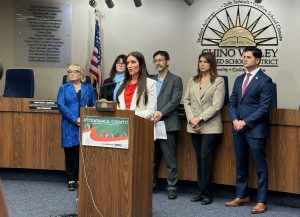On Friday, the House Democrats voted against a motion proposed by Republican Representative Cathy McMorris Rodgers that would’ve recognized unborn babies as “vulnerable populations” on Friday.
Representative Cathy McMorris Rodgers presented a motion to protect unborn babies from harmful chemicals. Keep in mind that the vote had nothing to do with abortion, yet Democrats and House Speaker Nancy Pelosi are so pro-abortion that they refused to support a vote.
On January 10th, the House approved H.R. 535, legislation to designate and label certain chemicals found in cosmetics, cooking-spray, and other similar products as health hazards.
Just before the House voted, Republican Congresswoman Cathy McMorris Rodgers, who is the Republican leader for the Energy and Commerce Subcommittee on Consumer Protection and Commerce, proposed a motion to send H.R. 535 back to committee to amend the bill to include protections for unborn children exposed to such chemicals.
Congresswoman Cathy McMorris Rodger’s motion, aside from including protections for unborn children, also wanted to include unborn children in the “vulnerable populations” list.
BREAKING: Democrats JUST blocked us from protecting unborn children from hazardous chemicals that harm development.
— CathyMcMorrisRodgers (@cathymcmorris) January 10, 2020
RT to tell them to stop denying the science that the development of a child starts in the womb. #prolife pic.twitter.com/G2a3q06uIN
“Republicans today stood for the most vulnerable among us – the unborn,” House Leader Kevin McCarthy told the Daily Caller News Foundation. “It is sickening that Democrats have used their majority to stand with their socialist base rather than with the most defenseless in our society.”
219 Democrats voted against the motion. Only four Democrats voted for McMorris Rodgers’ motion.
“When it comes to pregnant women that are at risk, there are two people at risk,” McMorris Rodgers said Friday. “The pregnant woman, and the unborn child.”
McMorris Rodgers pointed out that the unborn child is “the most vulnerable population” in need of protection.
“This motion to recommit is simple, it’s clear, it’s direct. It clarifies the protection of vulnerable populations must include any unborn child,” McMorris Rodgers added. “Yesterday Chairman Pallone recognized the potential harm these chemicals can have on child development. Today, Speaker Pelosi reiterated the importance of protecting expectant mothers. By rejecting this amendment, you would be further denying the science of the development of a child in the womb.”
Here are Rep. McMorris Rodgers’ full remarks:
“This amendment is a good faith effort to improve this legislation in a way that enhances its efforts to protect all Americans from harmful chemicals.
“Section 5 of H.R. 535 seeks to guarantee protection of vulnerable populations from potential PFAS dangers in their drinking waters. It states that the new rules ‘shall be protective of the health of subpopulations at greater risk.’
“The Safe Drinking Water Act already identifies pregnant women as an at-risk group. However, there is not one, but two people put at risk in that situation: the pregnant mother and her unborn child.
“The science is clear. Today’s technology allows us to look inside the womb now. We can see the baby’s developments day by day, week by week. That person is the most vulnerable population that should be protected.
“This Motion to Recommit is simple, clear, and direct. It clarifies that the protection of “vulnerable populations” must include any unborn child.
“Yesterday, Chairman Pallone recognized the potential harm these chemicals can have on child development. Today, Speaker Pelosi reiterated the importance of protecting expecting mothers. By rejecting this amendment, the Majority would be denying the science of the development of a child in the womb.
“This Motion is consistent with policy the EPA itself has employed – considering the impact of chemical exposures to babies in the womb. For example, in 2011 the EPA under President Obama decided to regulate certain chemicals in drinking water, based in part on the impacts to the in-utero person.
“Congress also passed a bipartisan law in 2004, the Unborn Victims of Violence Act, recognizing the personhood of an unborn child.
“This Motion makes a small, but vital improvement to this bill. It is an improvement that is necessary to preserve the central goal of the bill’s sponsors – protecting vulnerable populations. If that is the Majority’s goal than this amendment should be accepted.
“It does not strike or delay anything in the bill. It only clarifies what is considered a vulnerable population, based on the same language of a bipartisan 2004 law.
“And most importantly, it protects the unborn child. This is something I hope everyone in this room can agree should be one of our greatest priorities—to protect people before they are born and at every stage of their lives.
“I urge my colleagues to support science by supporting my Motion to Recommit and yield back the balance of my time.”










